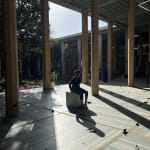

Susana Pilar Delahante Matienzo
Historias Negras was born from my research into my African heritage and ancestry, guided by the stories of my family—especially the elders, some over 90 years old—who revealed to me that our ancestors came from Congo and Sierra Leone.
I first performed this piece in Belgium to address the country’s historical ties to the Democratic Republic of Congo (RDC) and the transatlantic slave trade. As part of the African diaspora, I see this history as deeply personal. Though my ancestors were forcibly separated, that very fragmentation has connected us into a vast and extended family. In this way, the history of any African or African descendant is also my own, as we are all intrinsically linked.
The second performance took place in Senegal, a place of profound historical significance where many of my ancestors were torn from their homeland, enslaved, and forced through the infamous Door of No Return to the Americas. The diaspora is a direct consequence of this violent displacement, which is why it was essential for me to perform in Senegal and recount these Black histories from within that space.
In the performance, I create all the origami figures using only my feet—a deliberate act that references the atrocities committed during the Belgian colonization of Congo, when many Congolese people were mutilated and had their hands severed as punishment. Through this gesture, I transform the act of creation into a statement of resistance and remembrance.
The room slowly fills with black origami figures as I continue folding new ones with my feet, while my hands remain motionless and inactive. Each figure is a direct reference to the brutal actions inflicted upon Africans during the slavery period. Over the course of three hours, the repetitive, meditative process unfolds as an act of endurance and reflection, urging Belgium and other former colonial powers to confront their past with honesty and accountability. This, I believe, is not only necessary but a fundamental gesture of respect.








